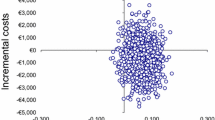Abstract
Background
Proven interventions to reduce adverse drug reactions (ADRs) in older hospitalised patients are lacking. Previous randomised controlled trial (RCT) data indicate that a structured pharmacist review of medication (SPRM) can reduce inappropriate prescribing in older hospitalised patients. However, no RCT data show that an SPRM reduces ADRs in this population.
Methods
We performed a cluster RCT comparing a clinical decision support software (CDSS)-supported SPRM intervention with standard pharmaceutical care in older patients hospitalised with an acute unselected illness. Over 13 months, we screened 1833 patients aged ≥65 years admitted to specialist services other than geriatric medicine for study inclusion. We randomised 361 patients to the trial intervention arm and 376 patients to the control arm, applying the intervention at a single timepoint within 48 h of admission. The primary endpoint (ADR incidence) was assessed at 7–10 days post-admission or at discharge (whichever came first). The secondary endpoints were the median hospital length of stay (LOS) and hospital mortality rate.
Results
Attending clinicians in the intervention group implemented 54.8 % of SPRM/CDSS prescribing recommendations. Ninety-one ADRs occurred in 78 control patients (20.7 %) compared with 61 ADRs in 50 intervention patients (13.9 %), i.e., an absolute risk reduction of 6.8 %. The number needed to treat (NNT) to prevent one patient having one ADR was 15; the total NNT to prevent one ADR was 14. The median LOS and hospital mortality were not significantly different.
Conclusion
An SPRM delivered on a CDSS platform significantly reduces ADR incidence in acutely hospitalised older people.


Similar content being viewed by others
References
Gallagher P, Ryan C, Byrne S, et al. STOPP (Screening Tool of Older Person’s Prescriptions) and START (Screening Tool to Alert doctors to Right Treatment). Consensus validation. Int J Clin Pharmacol Ther. 2008;46(2):72–83.
Fick DM, Cooper JW, Wade WE, et al. Updating the Beers criteria for potentially inappropriate medication use in older adults: results of a US consensus panel of experts. Arch Intern Med. 2003;163(22):2716–24.
Petrovic M, van der Cammen T, Onder G. Adverse drug reactions in older people: detection and prevention. Drugs Aging. 2012;29(6):453–62.
O’Connor MN, Gallagher P, O’Mahony D. Inappropriate prescribing: criteria, detection and prevention. Drugs Aging. 2012;29(6):437–52.
Cherubini A, Ruggiero C, Gasperini B, et al. The prevention of adverse drug reactions in older subjects. Curr Drug Metab. 2011;12(7):652–7.
Routledge PA, O’Mahony MS, Woodhouse KW. Adverse drug reactions in elderly patients. Br J Clin Pharmacol. 2004;57(2):121–6.
Holt S, Schmiedl S, Thurmann PA. Potentially inappropriate medications in the elderly: the PRISCUS list. Dtsch Arztebl Int. 2010;107(31–32):543–51.
Passarelli MC, Jacob-Filho W, Figueras A. Adverse drug reactions in an elderly hospitalised population: inappropriate prescription is a leading cause. Drugs Aging. 2005;22(9):767–77.
O’Connor MN, Gallagher P, Byrne S, et al. Adverse drug reactions in older patients during hospitalisation: are they predictable? Age Ageing. 2012;41(6):771–6.
Davies EC, Green CF, Taylor S, et al. Adverse drug reactions in hospital in-patients: a prospective analysis of 3695 patient-episodes. PLoS One. 2009;4(2):e4439.
Pirmohamed M, James S, Meakin S, et al. Adverse drug reactions as cause of admission to hospital: prospective analysis of 18 820 patients. BMJ. 2004;329(7456):15–9.
Spinewine A, Fialova D, Byrne S. The role of the pharmacist in optimizing pharmacotherapy in older people. Drugs Aging. 2012;29(6):495–510.
Kaur S, Mitchell G, Vitetta L, et al. Interventions that can reduce inappropriate prescribing in the elderly: a systematic review. Drugs Aging. 2009;26(12):1013–28.
Spinewine A, Dhillon S, Mallet L, et al. Implementation of ward-based clinical pharmacy services in Belgium—description of the impact on a geriatric unit. Ann Pharmacother. 2006;40(4):720–8.
Spinewine A, Swine C, Dhillon S, et al. Effect of a collaborative approach on the quality of prescribing for geriatric inpatients: a randomized, controlled trial. J Am Geriatr Soc. 2007;55(5):658–65.
Murray MD, Ritchey ME, Wu J, et al. Effect of a pharmacist on adverse drug events and medication errors in outpatients with cardiovascular disease. Arch Intern Med. 2009;169(8):757–63.
Mueller SK, Sponsler KC, Kripalani S, et al. Hospital-based medication reconciliation practices: a systematic review. Arch Intern Med. 2012;172(14):1057–69.
Schnipper JL, Hamann C, Ndumele CD, et al. Effect of an electronic medication reconciliation application and process redesign on potential adverse drug events: a cluster-randomized trial. Arch Intern Med. 2009;169(8):771–80.
Hodkinson HM. Evaluation of a mental test score for assessment of mental impairment in the elderly. Age Ageing. 1972;1(4):233–8.
Mahoney FI, Barthel DW. Functional evaluation: the Barthel Index. Md State Med J. 1965;14:61–5.
Salvi F, Miller MD, Grilli A, et al. A manual of guidelines to score the modified cumulative illness rating scale and its validation in acute hospitalized elderly patients. J Am Geriatr Soc. 2008;56(10):1926–31.
WHO. Guidelines for ATC classification and DDD assignment. 2011. http://www.whocc.no/filearchive/publications/2011guidelines.pdf. Accessed Sept 2015.
British Medical Association and Royal Pharmaceutical Society of Great Britain. British National Formulary. 58th ed. London: BMJ Publishing Group; 2011.
World Health Organisation (WHO). International drug monitoring—the role of the national centers. Geneva: World Health Organisation (WHO); 1972.
Hamilton H, Gallagher P, Ryan C, et al. Potentially inappropriate medications defined by STOPP criteria and the risk of adverse drug events in older hospitalized patients. Arch Intern Med. 2011;171(11):1013–9.
World Health Organisation (WHO). Causality assessment of suspected adverse reactions. http://who-umc.org/Graphics/24734.pdf. Accessed Sept 2015.
Hallas J, Harvald B, Gram LF, et al. Drug related hospital admissions: the role of definitions and intensity of data collection, and the possibility of prevention. J Intern Med. 1990;228(2):83–90.
Hartwig SC, Siegel J, Schneider PJ. Preventability and severity assessment in reporting adverse drug reactions. Am J Hosp Pharm. 1992;49(9):2229–32.
Hanlon JT, Weinberger M, Samsa GP, et al. A randomized, controlled trial of a clinical pharmacist intervention to improve inappropriate prescribing in elderly outpatients with polypharmacy. Am J Med. 1996;100(4):428–37.
Schmader KE, Hanlon JT, Pieper CF, et al. Effects of geriatric evaluation and management on adverse drug reactions and suboptimal prescribing in the frail elderly. Am J Med. 2004;116(6):394–401.
O’Connor M, O’Sullivan D, Gallagher P, et al. Prevention of adverse drug events in hospitalized older patients: a randomised controlled trial using STOPP/START criteria. Eur Geriatr Med. 2012;3:S132.
University College Cork. Adverse drug event prevention using structured pharmacist review [ClinicalTrials.gov identifier NCT01467128]. US National Institutes of Health, ClinicalTrials.gov. http://clinicaltrials.gov/show/NCT01467128. Accessed 2 Nov 2015.
Author information
Authors and Affiliations
Corresponding author
Ethics declarations
Funding
A funding body (Health Research Board of Ireland: HRA_HSR/2010/14) grant funded this work.
Conflicts of interest
All authors have completed the Unified Competing Interest form at http://www.icmje.org/coi_disclosure.pdf (available on request from the corresponding author) and declare the following: David O’Sullivan and Marie O’Connor were funded by a Health Research Board Ireland grant to conduct this research using the STOPP/START criteria. Denis O’Mahony and Stephen Byrne were members of the development and validation team that created the STOPP/START criteria and are named on a patent of computer software which used these criteria. Paul Gallagher was a member of the development and validation team that created the STOPP/START criteria. Shane Cullinan, Richard O’Sullivan, James Gallagher and Joseph Eustace have no conflicts of interest relevant to the content of this study.
Ethical approval
The trial protocol was approved by the biomedical ethics committee (institutional review board) of the University College Cork teaching hospital network.
Author contributions
David O’Sullivan, Denis O’Mahony and Stephen Byrne wrote the manuscript. David O’Sullivan, Denis O’Mahony, Stephen Byrne and Joseph Eustace analysed the data. David O’Sullivan, Denis O’Mahony and Stephen Byrne designed the research. David O’Sullivan, Marie O’Connor, Paul Gallagher, Shane Cullinan, Richard O’Sullivan and James Gallagher performed the research.
Rights and permissions
About this article
Cite this article
O’Sullivan, D., O’Mahony, D., O’Connor, M.N. et al. Prevention of Adverse Drug Reactions in Hospitalised Older Patients Using a Software-Supported Structured Pharmacist Intervention: A Cluster Randomised Controlled Trial. Drugs Aging 33, 63–73 (2016). https://doi.org/10.1007/s40266-015-0329-y
Published:
Issue Date:
DOI: https://doi.org/10.1007/s40266-015-0329-y




